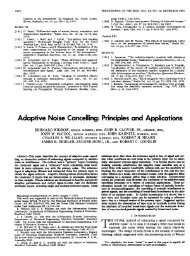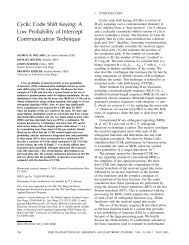- Page 1 and 2: UNIVERSITY OF CALIFORNIA, SAN DIEGO
- Page 3 and 4: The dissertation of Steve C. Thomps
- Page 5 and 6: TABLE OF CONTENTSSignature Page . .
- Page 7 and 8: 7 Conclusions . . . . . . . . . . .
- Page 9 and 10: 2.17 PAPR CCDF of clipped OFDM sign
- Page 11 and 12: B.3 Running average of papers read
- Page 13 and 14: ACKNOWLEDGEMENTSI want to first tha
- Page 15 and 16: S. C. Thompson, J. G. Proakis, and
- Page 17: this thesis, the fundamental aspect
- Page 21 and 22: 4All of these techniques require kn
- Page 23 and 24: 6frequency of the kth subcarrier is
- Page 25 and 26: 85Channel power (dB)0-5-10-15-20-25
- Page 27 and 28: 10OFDM signal isandR {s(t)} =I {s(t
- Page 29 and 30: 12Nonlinearities in the transmitter
- Page 31 and 32: 141.5 Thesis OverviewIn Chapter 2 t
- Page 33 and 34: 162.1 More OFDM Basics2.1.1 The Cyc
- Page 35 and 36: 18where b(t) ≠ ∑ N−1k=0 I ke
- Page 37 and 38: 20where {n[i]} are samples of the n
- Page 39 and 40: 22(FDE). Such an equalizer can be u
- Page 41 and 42: 242.2 PAPR StatisticsThe peak-to-av
- Page 43 and 44: 26level the bound is tight. Notice
- Page 45 and 46: 28To reduce nonlinear distortion in
- Page 47 and 48: 30than the K = −3 dB curves for a
- Page 49 and 50: 322.4.2 Performance DegradationNext
- Page 51 and 52: 341010 −1Ideal PASSPA: IBO = 3 dB
- Page 53 and 54: 36Potential rangePotential range w/
- Page 55 and 56: 38Signal ClippingThe remainder of t
- Page 57 and 58: 4010 010 −1ClippedUnclippedP (PAP
- Page 59 and 60: 42efficiency). The distortion cause
- Page 61 and 62: 445OFDMCE-OFDM4Instantaneous signal
- Page 63 and 64: 46The idea of transmitting OFDM by
- Page 65 and 66: 48where σ 2 Iis the data symbol va
- Page 67 and 68: 50Unit circleStarting point(a) L =
- Page 69 and 70:
5210 0FOBP(f) ˆB rms10 −1Fractio
- Page 71 and 72:
540Welch estimateterms from (3.30)
- Page 73 and 74:
56figure shows that the CE-OFDM spe
- Page 75 and 76:
Chapter 4Performance of ConstantEnv
- Page 77 and 78:
60Lowpassfilterr bp (t)Bandpassfilt
- Page 79 and 80:
62Phase demodulatorr[i]FIRfilterarg
- Page 81 and 82:
64for DCT and DFT modulations [(3.7
- Page 83 and 84:
6610 0System 1System 2Approx (4.35)
- Page 85 and 86:
68Bit error rateBit error rate10
- Page 87 and 88:
700L fir , f cut/W−209, 0.7Magnit
- Page 89 and 90:
72receiver, as shown in Figure 4.10
- Page 91 and 92:
74constant K = 2πhC N , isρ m,n (
- Page 93 and 94:
7610.5p1/πKρm,n(K)0−0.5012K345(
- Page 95 and 96:
784.2.2 Asymptotic PropertiesIn Fig
- Page 97 and 98:
8010 0p ξ (x)GaussianProbability d
- Page 99 and 100:
82To plot the spectral efficiency v
- Page 101 and 102:
84Figure 4.18 compares CE-OFDM with
- Page 103 and 104:
Chapter 5Performance of CE-OFDM inF
- Page 105 and 106:
88and for the Rayleigh channel, as
- Page 107 and 108:
901Transition regionConditional bit
- Page 109 and 110:
92Bit error rate(a) M = 2, 2πh = 0
- Page 111 and 112:
Chapter 6Performance of CE-OFDM inF
- Page 113 and 114:
96the signal-to-noise ratio, making
- Page 115 and 116:
98µs, which results in N c = ⌊τ
- Page 117 and 118:
100Using a DFT size N DFT = JN = N
- Page 119 and 120:
1020.90.84|h[i]| 20.70.60.50.40.30.
- Page 121 and 122:
104|h[i]| 20.60.50.40.30.2Magnitude
- Page 123 and 124:
106|h[i]| 20.350.30.250.20.150.1Mag
- Page 125 and 126:
108Channels C, E and F—degrades p
- Page 127 and 128:
110• Delay spread:B (2)ττ =√
- Page 129 and 130:
112The last model, Channel D f , ha
- Page 131 and 132:
114propagation paths [the WSSUS ass
- Page 133 and 134:
116by (2.9).So long as the duration
- Page 135 and 136:
118Table 6.3: Data symbol contribut
- Page 137 and 138:
12010 −1Bit error rate10 −210
- Page 139 and 140:
122This problem can be suppressed w
- Page 141 and 142:
Appendix AGenerating Real-Valued OF
- Page 143 and 144:
126i = 0, 1, . . . , N − 1. Thus,
- Page 145 and 146:
Appendix BMore on the OFDM Literatu
- Page 147 and 148:
130First, to get an idea of the siz
- Page 149 and 150:
1328Papers read per day (log scale)
- Page 151 and 152:
Appendix CSample CodeThe simulation
- Page 153 and 154:
136CN=sqrt(2/(N*varI));% normalizin
- Page 155 and 156:
138end%% Demodulate and detecthatph
- Page 157 and 158:
140set ticscale 0.5set border 31 li
- Page 159 and 160:
142kHz kilohertz (1 thousand cycles
- Page 161 and 162:
144x(t) x as a function of tx[i] di
- Page 163 and 164:
146f ′f cf saFOBP(f)FOBP(f) ˆg(t
- Page 165 and 166:
Bibliography[1] N. Abramson, “Ban
- Page 167 and 168:
150[24] A. G. Armada, “Phase Nois
- Page 169 and 170:
152[50] P. A. Bello, “Characteriz
- Page 171 and 172:
154[78] R. Castle and A. Jones, “
- Page 173 and 174:
156[104] L. J. Cimini, Jr. and N. R
- Page 175 and 176:
158[131] Debian—The Universal Ope
- Page 177 and 178:
160[157] O. Feely, “Nonlinear Dyn
- Page 179 and 180:
162[185] S. Gifford, J. E. Kleider,
- Page 181 and 182:
164[213] H.-H. Hsieh and C.-H. Wei,
- Page 183 and 184:
166[241] S. M. Ju and S. H. Leung,
- Page 185 and 186:
168[269] ——, “PAR Reduction i
- Page 187 and 188:
170[297] Y. G. Li, L. J. Cimini, Jr
- Page 189 and 190:
172[325] M. M. Martone, “A Multic
- Page 191 and 192:
174[353] R. Morrison, L. J. Cimini,
- Page 193 and 194:
176[379] H. Ochiai and H. Imai, “
- Page 195 and 196:
178[408] A. Peled and A. Ruiz, “F
- Page 197 and 198:
180[435] ——, “Pilot Spacing i
- Page 199 and 200:
182[462] ——, “Channel equaliz
- Page 201 and 202:
184[491] E. A. Sourour and M. Nakag
- Page 203 and 204:
186[520] C. Tellambura and M. G. Pa
- Page 205 and 206:
188[548] C. van den Bos, M. H. L. K
- Page 207 and 208:
190[575] W. D. Warner and C. Leung,
- Page 209 and 210:
192[604] H. Yang, “A Road to Futu
- Page 211:
Production NotesThis thesis was typ




